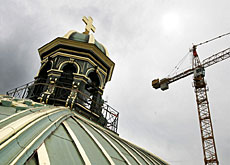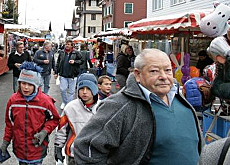Consensus will still play central role

Swiss politics will continue to revolve around the art of compromise despite gains by the rightwing Swiss People's Party and the Greens in Sunday's federal elections.
Political analysts say the centre-right will still play a pivotal role in parliament as in previous years, with the result that major changes are not in the offing.
Analysts are quick to point out that the balance of power in the House of Representatives and the Senate has not changed, with the Right keeping a firm grip on matters.
They say the fact that the People’s Party grabbed some seats from the centre-right or that the centre-left Social Democrats lost ground on the Greens is only of minor significance.
“The relationship between the left and right of parliament has remained stable,” said Hans Hirter of Bern University. “The Left lost a bit of ground, but as it has never been able to hold the majority, it has always relied on alliances; this has not changed.”
The Left will not be the only ones looking for partners. Even the People’s Party, with 29 per cent of the vote, is not powerful enough to dictate the course followed by the two chambers.
“It’s harder to find a compromise nowadays than it was in the past, but there is no escaping it,” admits Yannis Papadopoulos of Lausanne University. “The main parties have no choice.”
The centre-right stands to gain the most from the situation, with possible alliances both with the People’s Party and the Left. For the Radicals, who suffered on Sunday, losing voters is not as disastrous as it might have seemed.
“The Swiss system is such that electoral gains do not guarantee more influence [in parliament],” Papadopoulos told swissinfo. “Even the losers still have some influence, especially the parties at the centre who are needed to pass new legislation.
“I’m convinced that the centre-right will retain its pivotal role. There will be no major changes during the upcoming legislative period,” he added.
Cabinet changes
The other major question that has been raised in the aftermath of the elections is whether the composition of the seven-member cabinet should be revamped.
Traditionally, the four main parties are represented in the government based on their strength. This was how the People’s Party gained a second portfolio at the expense of the centre-right Christian Democrats in 2003.
Analysts say this kind of change is unlikely this time.
“I don’t think we will see any changes to the cabinet composition,” said Hirter. “There is no reason for the People’s Party to demand a third portfolio since two correspond to its electoral strength.”
Hirter reckons that the debate about whether to evict the People’s Party leader Christoph Blocher from the government or the two Social Democrats was purely rhetorical.
“The People’s Party did something you usually see abroad, but not in Switzerland: it campaigned in favour of Blocher,” he added. “It probably helped the party earn a few more votes.”
Centre-right struggle
The only possible change might concern the two centre-right parties, with the Christian Democrats demanding a second portfolio. But the losers would be the Radicals, considered the weakest element of the government.
Reaching this goal anytime soon promises to be difficult though. To succeed, the Christian Democrats would have to convince the Left or the People’s Party to lend their support, not an easy task.
Another outcome could be a merger between the Radicals and the Christian Democrats, an idea that has been suggested a number of times over the past few years.
Hirter says that it is unlikely this will happen at all, pointing out that there is no real advantage in being the strongest party.
“The People’s Party for example might be the biggest party, but it behaves like it was in the minority,” he told swissinfo. “And in the cantons, Radicals and Christian Democrats are often opposed to each other.”
swissinfo, Olivier Pauchard

More
Government, ministers, president
According to exit polls carried out by the gfs.berne institute, 46 per cent of voters decided who they would vote for less than two weeks before the elections.
Clashes between members of the so-called Black Block and police in the capital Bern two weeks before the vote are believed to have helped the People’s Party gain more votes. The rioters prevented members and sympathisers of the rightwing movement from marching to Parliament Square in the centre of the city.
At the same time, support for the Social Democrats dropped.
The Radicals were also successful in attracting voters during the last two weeks of the campaign, getting more than 15 per cent of the vote after polls only gave them 11 per cent.
Only 27 per cent of voters knew for sure who they would vote for early on. During the final week, 29 per cent made up their minds, while 17 per cent knew two weeks before.
The number of women in the 200-seat House of Representatives has risen to 59 from 52 in 2003. The biggest gain was made by the People’s Party where women won five of the party’s seven new seats. But the party still has the lowest overall percentage of women parliamentarians at 13%.
The youngest parliamentarian is Lukas Reimann (25 years old) and the elder statesman title goes to Jacques Neirynck (76 years old). The average age for parliamentarians is 52.
Ricardo Lumengo is the first black candidate to be elected into the House of Representatives. The lawyer, who lives in Biel, is of Angolan origin and is a former asylum seeker.
None of the 44 Swiss candidates living abroad was elected.

In compliance with the JTI standards
More: SWI swissinfo.ch certified by the Journalism Trust Initiative













You can find an overview of ongoing debates with our journalists here . Please join us!
If you want to start a conversation about a topic raised in this article or want to report factual errors, email us at english@swissinfo.ch.